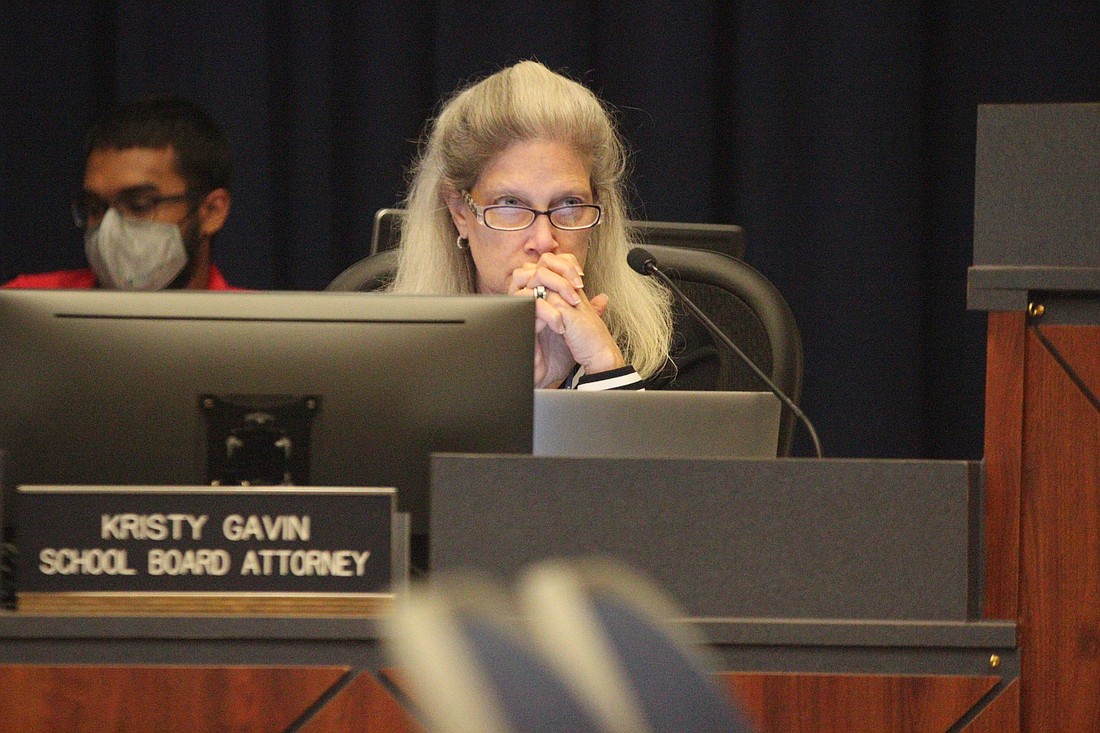- December 15, 2025

By protecting transgender students, the school district is following the law, district staff said to a skeptical audience at an April 20 School Board workshop.
Almost 70 community members attended the workshop to address the board on the district’s accommodations for transgender students, although the board was not scheduled to vote on the subject: Trans-related issues were on the agenda only as a staff presentation about the district’s existing practices.
"There’s a reason this law is on the books: because some of the unintended consequences are students, young people, get hurt — by their own family."
— COLLEEN CONKLIN, School Board member, on laws prohibiting school district staff from 'outing' LGBT students to their parents
Most of the people who spoke objected to district guidance that bars school personnel from “outing” a student to their parents as transgender or gay, lesbian or bisexual against the student’s wishes. A smaller number said they opposed trans students’ rights to access the locker rooms and restrooms that align with their gender identity.
A few spoke in favor of trans students’ rights.
But most of the issues were already settled, district staff said, not so much by the School Board as by the law.
Board member Colleen Conklin asked School Board Attorney Kristy Gavin for some clarity.
“Kristy, just yes or no: Is it illegal to ‘out’ a student?” Conklin said.
“Yes,” Gavin said. “We could be finding ourself with a lawsuit.”
Conklin said it was great that the people who thought the district should “out” students to their parents came from accepting families. But, “Not all students are in that environment,” she said.
She noted that homeless teens are disproportionately likely to be LGBT, because LGBT children are kicked out of their families or subjected to violence at home.
“Students deserve to come to school and be safe, and we have an obligation to follow the law,” she said. “The bottom line is ... it is illegal for that information to be shared at this moment in time.”
Board member Jill Woolbright was displeased that district staff created procedures without informing the board and had attended a workshop held by the LGBT advocacy group Equality Florida, calling it “extreme,” political and partisan.
She then suggested three conservative-leaning activist groups that she said the district could have consulted instead.
She added that she was concerned about girls’ privacy in bathrooms — suggesting the district look at making stalls more private — and that students who disclosed their gender identity or sexual orientation to a school guidance counselor were given an opportunity to “rate” how unsupportive they believed their parents were.
“If they haven’t ‘outed’ to their parents, how do they know how to rate their parents?” she asked.
Gavin said students may be aware of their parents’ views on transgender issues, since they’ve become a hot-button topic.
Woolbright said that any trans student seeking accommodations such as switching pronouns would likely eventually be outed to their parents anyway, and she felt parents should be the first to know, not the last.
Board member Janet McDonald agreed.
“This is not equity, this is special exception,” she said. “And how many other groups — I don’t know what other groups there would be — but how many other groups or how many other people have requested that we carve out a special way for us to interact with them, that we can think of? Because I couldn’t think of any.”
She said the district should not be creating more work for teachers, who have enough to deal with covering the curriculum and shouldn’t have to worry about using the wrong pronoun.
“I think that’s really beyond the call of duty for our teachers,” she said.
Teacher Abbey Cooke, speaking in the meeting’s public comment period, said teachers already make accommodations for students for other reasons.
“It’s our job to protect our students’ privacy, and that doesn’t put more work on me as a teacher: I have safety plans, I have 504s, I have IEPs, so this is not going to be any different,” Cooke said, referring to procedures for accommodating students with physical, behavioral or cognitive exceptionalities.
Board member Cheryl Massaro said it’s imperative to remember that there are all kinds of parents out there — including bad ones.
She’d been presented with the opportunity last year to work with a transgender student, she said, “who was petrified — petrified — to tell her family ... for fear that she was going to be physically hurt.”
In some families, Massaro said, "If they even mention the fact that they may be gay, or ... they don’t feel like they're in the right body, that parent will beat the crap out of that kid, because it's 'not right,' because it's 'not acceptable.' And I don't think there's a person in this room who'd want to see that happen to any child."
The board did not come to a decision on which procedures, if any, to revisit.